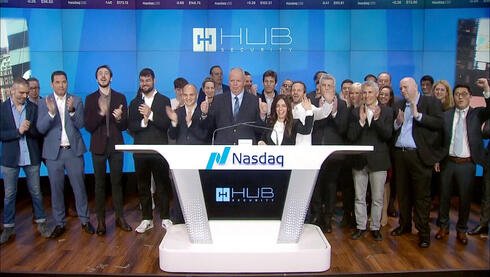Hedge fund Dominion Capital is seeking to declare Hub Security insolvent. The fund submitted a request to the District Court in Tel Aviv-Yafo on Tuesday, claiming that Hub has a debt of NIS 11.6 million (approximately $3.1 million), past due, and all attempts to collect the loan money from the company have failed. According to the fund, it became evident that “not only does the company lack an economic horizon, but it also lacks economic feasibility, and it is highly doubtful if it ever had any at this stage.”
Dominion claims that Hub Security continues to deepen its debts and accumulate new liabilities totaling millions of dollars despite being insolvent. The lawsuit was filed by the company in Israel after it requested to file a similar request in New York.
According to the lawsuit, Dominion Capital entered into a financing agreement with Hub, providing a short-term loan of $2.5 million. The interest rate, in case of non-payment on time, was set at 24% per year. The maturity date is April 28, 2023. In return for the loan, Hub allocated one million ordinary shares to Dominion, and as of now, Dominion owns 4.6% of Hub’s shares. Despite nearly a year passing, the fund says the debt remains unpaid, and the company has not responded to the fund’s inquiries but has proposed new agreements for repayment.
Dominion explains that Hub Security is unable to meet its obligations, as evidenced by its financial reports. Hub Security closed 2022 with a net loss of $80 million and a total loss of $85.5 million, compared to a net loss of $13.1 million in 2021, marking a sixfold increase. In January-June 2023, Hub Security lost $69 million, more than three times the loss in the corresponding period. The losses deepened due to merger expenses of $40 million.
Dominion’s claim also relies on Calcalist’s report regarding the former CEO’s statement that the company’s initial predictions were disconnected from reality. According to him, only after the company made several acquisitions in recent months could it present a mature product for protection against cyber attacks.
Hub Security went public via a SPAC merger at a valuation of $1.3 billion in February 2023. However, investors who participated in the SPAC issuance ended up redeeming their investment. PIPE investors did not transfer the promised funds either, leading Hub Security to enter into an equity line agreement, typical for companies in problematic situations, to obtain a line of credit in exchange for shares and options.
According to Dominion’s lawsuit, “at the time of the merger in March 2023, the company claimed to have completed the development of the product it intends to market and forecasted annual revenue of $91 million. However, these representations by the company and its management turned out to be false.”
Most of the management was replaced during and after the IPO. Founder Eyal Moshe and his partner Ayelet Bitan, who served as VP of Human Resources, left the company amidst an independent committee’s investigation into suspicions of misusing company funds for personal needs, including renovating their house in Tel Aviv.
Moshe was replaced by Uzi Moscovich, who has since been supplanted by Noah Hershcoviz.
Hub Security’s value on Nasdaq has dropped by 99% since going, now amounting to only $12 million.
Hub Security’s response: “This is a request from a bad faith applicant who has never invested in the company, part of a commercial dispute ongoing in the U.S. to deplete funds. The request is baseless, intended to retroactively correct prohibited stock manipulation, causing serious damages to the company. The applicant knows this and, as evidence, did not seek temporary relief.
“Hub is a solid company trusted by investors, announcing a week ago fundraising of over $8 million and the purchase of shares in QPoint Technologies, which has annual revenues exceeding $26 million, and is working to submit its financial statements on time in accordance with U.S. law.”

